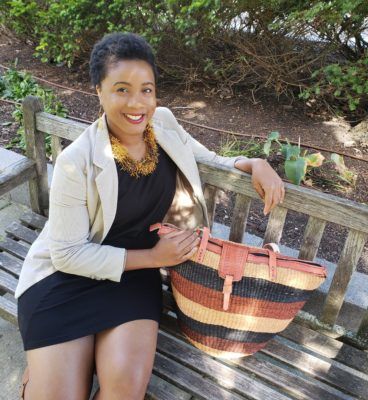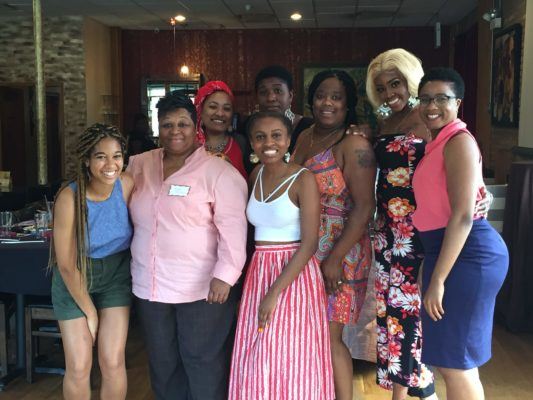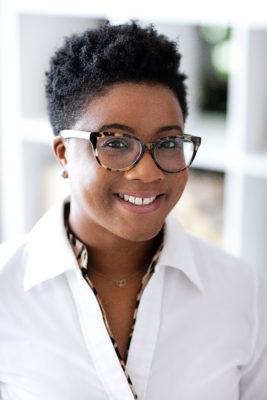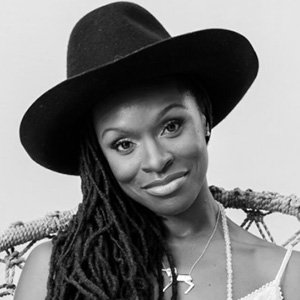Should We Be Talking About “Mental Wellness,” Not “Mental Health”?
Mental health issues affect everyone, but research suggests people in the Black community are less likely to have access to culturally competent care. According to the American Psychiatric Association, only one in three African Americans who need mental health care receive it.
That's where organizations like Chicago's Sista Afya Community Mental Wellness are making a difference. Founded by Camesha L. Jones, LSW, the group serves fellow Black women through mental wellness education, workshops, group and individual therapy, and community outreach. The idea, as Jones puts it, is to make mental wellness simple, accessible, affordable, and centered around Black women's experiences. Here, she speaks with Well+Good Council member Latham Thomas about the healing power of community—and why she prefers the phrase "mental wellness" over "mental health."
Latham Thomas: Where did you come up with the idea for Sista Afya?
Camesha Jones: I like to call myself a mental illness survivor and a community mental wellness advocate. After I was diagnosed with bipolar disorder and had been hospitalized twice, I was looking for resources for Black women but I wasn't finding anything.
In 2015, I was in the midst of my graduate school training in social work. I thought that with what I'd learned from my personal experience and in school, I could put the two together to create a community mental wellness organization—a platform for black women with mental health conditions to receive the support that they need through groups and classes. I believe that healing can really happen and transform people's lives through the power of community.

Latham Thomas: How did you come up with the name Sista Afya?

{{post.sponsorText}}
Camesha Jones: When I originally had the idea, I wanted to do something that's clearly connected to Black women and the diaspora. I began to look for words that that meant health and wellness and I came across afya, which in Swahili means to be free of psychological and physical illness. It also means to be well, to be healthy. And sista is a word that's used within the Black community to show family and connectedness. I put the two together because it encompasses the vision and it's unapologetically Black, for Black women. Our tagline is "Connecting to sustain." That's also a part of it—the more that we're connected to one another, the more resources that we know about, the better we are to experience freedom from illness.
"The more that we're connected to one another… the better we are to experience freedom from illness." —Camesha Jones
Latham Thomas: What does your self-care practice look like as you do this work to support others?
Camesha Jones: It involves a couple of different things. Some things I have to do as maintenance—such as taking my medication regularly, going to therapy, going to the psychiatrist. Those are the things that I actually have to do. Reading, dance, and fitness have been really helpful as well. Cooking is healing for me, as is trying different restaurants with my partner.
"We're thinking of out-of-the-box ways to present different options to help transform people's mental well-being." —Camesha Jones
Latham Thomas: I noticed that you talk about mental well-being, not mental health. Can you talk about that language choice?
Camesha Jones: The phrase "mental health" carries a stigma. When I was looking for something that encompasses many aspects of someone's life, I decided to focus on wellness in general, just because it's such a positive word. I've never heard anybody say, "Ew, wellness!" or want to shy away from that. So the wording was very intentional. We want people to know there are a lot of options for you to heal. Some people come to our support group, and some come to yoga class. Others come to individual or group therapy. And then we have social outings like brunches and mixers. We're thinking of out-of-the-box ways to present different options to help transform people's mental well-being.
 Latham Thomas: How is community a through-line in the work that you do?
Latham Thomas: How is community a through-line in the work that you do?
Camesha Jones: Historically, if you look at the research and the history of African Americans, we are a very collectivist culture. We do a lot of things in group. So to me, it only made sense for us to integrate with a part of our culture that was already a part of what's working. But also, I thought, "What would make me get out and engage in mental wellness?" I realized that having events centered around my experience would help me do that. So we do coffees and festivals, we do community outreach, and our ambassadors live in different areas of Chicago. We really just want to meet people where they are and let them know that this is a space created for you to be safe, to be brave, to be vulnerable, and to seek the support you need.
Latham Thomas: Is there a piece of advice that you received from an elder that has influenced how you're working now?
Camesha Jones: When I was going through everything with my mental health condition, my mother told me, "Use your experience to help other people. Don't let this be something that you carry on the inside with you." If we think about intersectiionality and feminism—the personal is political—these things ring true for me. I also see in so many of the women that I commune with that our personal experiences are the activation that we need to serve others—but also to help ourselves as well. I also think about [civil rights activist] Fannie Lou Hamer: "Everybody's not free until we're all free." The mental health field is can be very elitist. Not everyone can afford $150 for a session, or if you don't have access to the North Side, you're not going to be able to get this kind of care. That also comes with just breaking down the classism within mental health. Regardless of your income or your background, you deserve to experience the same amount of freedoms as somebody who's wealthy. That's very central to my personal work, but also with Sista Afya— is that everybody deserves this.
"Regardless of your income or your background, you deserve to experience the same amount of freedoms as somebody who's wealthy." —Camesha Jones

Latham Thomas: Are there any ancestral practices that inform your work?
Camesha Jones: One thing that I've noticed throughout my time as a social worker and through listening in the Black community is that arts are so important as a form of resistance. Even though so many other things were stripped from us as we went through the Middle Passage, we were able to create a culture. Creating art is healing in so many different ways. Anything that is a practice— whether it's dance, painting, open mic, anything—is something that we have within Sista Afya, because the arts are extremely powerful. One other thing is holistic healing. I know women who are elders in the community, and I seek knowledge about what are they using to heal themselves: What are they eating? What herbs are they taking? When I know something about that, I try to share it with other people.
Latham Thomas: What is your wellness mantra?
Camesha Jones: Something that I'm always thinking about is wholeness and how my mental wellness is wholeness. That sticks with me. If I had never gotten any type of healing or treatment with my mind, so many areas in my life would have deteriorated. And so, I think my mental wellness is wholeness because without it, I don't believe that I could do the things that I do—to support people and to be sound in mind and body.
Latham Thomas: What can we do to help lift the stigma and lack of understanding around mental hygiene?
Camesha Jones: One of the biggest things that I see is very cliché, but it's very central to supporting people with mental health conditions: We are all human. We all have things that we are struggling with. So we need to be kind, to listen, and not be quick to judge. That helps to break down stigma because somebody can be like, "I'm feeling depressed." When someone comes back with "Oh, just power through it and snap out of it," that's not listening or being kind; that's judgment.
It also helps for people to understand how many people are actually living with a mental health condition. I think about Simone Biles, the greatest gymnast of all time. She was on Good Morning America talking about how she takes anxiety medication. There are so many people who we look up to, but we don't know that they're dealing with these things.
Some people think that once you're diagnosed, it's over for you or that it's your whole identity. I think it's important for people to see that people are successful in various areas of their life, even though they have this health condition. I have bipolar disorder. That's pretty much one of the worst-stigmatized ones, but I still have a business. I'm still able to do things and [bipolar disorder] didn't stop me. If you're working with somebody or you love somebody who's struggling with a mental health condition, be willing to do the work so that person is able to thrive just like you.
 Latham Thomas is a master manifestor and the founder of Mama Glow, a healthy gal's guide to actualization in the modern world. Her second book, Own Your Glow, was recently published by Hay House Inc.
Latham Thomas is a master manifestor and the founder of Mama Glow, a healthy gal's guide to actualization in the modern world. Her second book, Own Your Glow, was recently published by Hay House Inc.
What—or whom—should Latham write about next? Send your questions and suggestions to experts@www.wellandgood.com.
Loading More Posts...